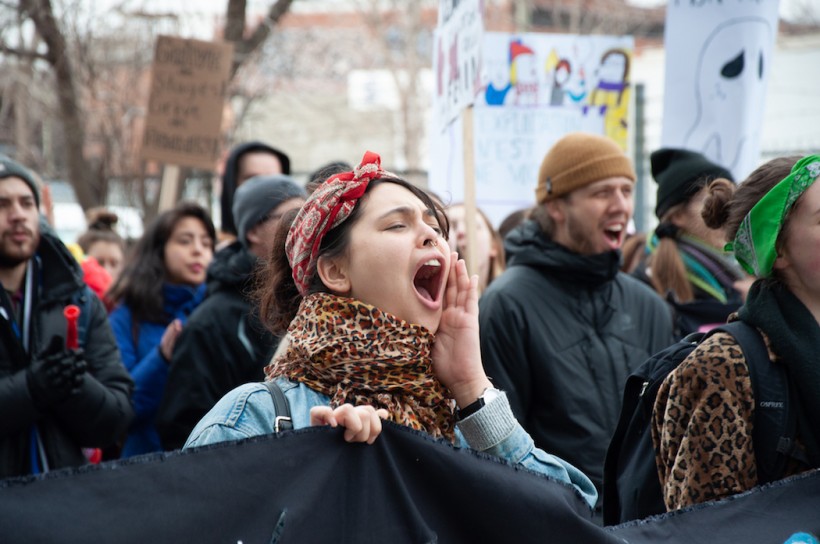“Because students are there to learn and not work for free.” Dario Guescini, Director of Work Integrated Learning at George Brown College.
In this episode of The Dialog podcast, Miriam Lafontaine, a journalism student at Concordia University, Montreal Quebec, tells us her involvement on the student strike movement against unpaid internships. Also, Dario Guescini, Director of Work Integrated Learning at George Brown College explains how his department and the Federal government are trying to build better work experiences for students.
Luiz Felipe Lamussi: Hello and welcome to The Dialog Podcast! My name is Luiz Felipe Lamussi, I need to update my resume and your host for this season!
And today we are going to talk about unpaid internships. That’s why I talked with Dario Guescini, Director Work Integrated Learning at George Brown College to understand how important internships are for students and how the college is helping us on that. But first, from March 18th until March 22th students all across Quebec were on strike demanding their provincial government to prohibit unpaid internships for students. That’s why I talked with Miriam Lafontaine, a journalism student at Concordia University and editor-in-chief at The Link, independent publication also at Concordia.
Lamussi: So today we have Miriam Lafontaine, she is a journalism student from Concordia University, from Montreal Quebec. How are you today?
Miriam Lafontaine: I guess I’m all right, just broke some news about some sexual violence complaints in the English department but other than that I think I’m having an okay morning.
Luiz Felipe Lamussi: Oh, so a really tough and busy morning right now?
Lafontaine: A busy morning but now the story is up so, yeah.
Lamussi: Okay so, next week from March 18 to March 22, the students in Quebec organized a strike against unpaid internships. What’s your role in that strike?
Lafontaine: So on March 18th a general unlimited strike against unpaid internships is going kick off across Quebec. Just to be clear with the journalism department at Concordia, we are going to go on strike on March 18th and keep it this one week strike. We are not going to keep going on and on with new strike votes. At least that is not the plan right now. Our plan is to take part in the Quebec-wide movement but just for one week. Some university departments are doing that too but there is a lot that will keep on striking until the government meets their demands.
Lamussi: Getting more into the why students are going to be on strike next week, why do you think students shouldn’t work in unpaid internships?
Lafontaine: I don’t think is about if students should or not. We are protesting and striking against unpaid internships, but to be honest I never made an intention to necessarily tell students that they shouldn’t do unpaid internships. I mean, I’ve done unpaid internships. It’s totally understandable why students accept unpaid internships. They want to have a fulfilling and sustainable career, they want to meet people, engage as much as possible on what they’re passionate are about.
My position has never really been to tell students to not take unpaid internships. I think that we have to make our demands not towards students and what they should do. Really the demands are on the employers, our universities and our provincial government.
The provincial government needs to change its labour code. Universities need to improve their regulations around internships. Universities need to stop asking students to take unpaid internships only if they want to do a course because for some students that’s the case. For instance, at Concordia, if you are a journalism student and you want to do an internship for course credit it can only be unpaid, that’s the regulation, and it is like that in other departments all over Quebec.
Lamussi: So students don’t have a different option, to graduate they need to do an unpaid internship?
Lafontaine: Well, it depends on the department. So at Concordia, if you want to do an internship as part of the journalism department it’s not a mandatory class. I mean, you don’t need to complete the class to graduate. However, because of how important internships are for career prospects, obviously most undergraduates in our department end up taking that class. Unless for those who can’t afford to work for free.

Miriam Lafontaine, journalism student at Concordia University. Photo by Erika Morris
Lamussi: Do you think it’s fair with those students that can’t afford to work for free?
Lafontaine: It’s definitely not fair, especially in journalism and media, and I think that it contributes to elitism in the industry and prevents people with who are low income and marginalized people from being able to access the industry. It makes it harder for so many people.
Lamussi: What are the college and in this case the university’s role on that? Do you think they could help students in a way?
Lafontaine: There are some things that are out of the university’s hands. For instance, it is on the employer to pay interns. Of course, we definitely understand that there is a limit on what Universities can do but we still think university need to do as much as possible to make connections with employers who are going to be willing to pay us.
That’s why the big general unlimited strike is all about demands towards the provincial government because if they change the Quebec labour code and they say you can’t make students do unpaid internships anymore than employers will be forced to pay students. So that’s why the big pressure is on the provincial government to act because universities can try to negotiate with these employers, and try and convince them to pay us, but if there is a law that forces then, then…
Lamussi: That’s the law and they will have to follow it.
Lafontaine: Yes! But also there are departments in the University that the provincial government mandates that they can only be unpaid internships. That’s the case for education for example. But there that universities have policies that say students can do an internship if it is unpaid and sometimes these internships are necessary to graduate, so universities across Quebec need to pass stronger regulations to correct this.
Lamussi: I don’t know if you know about the new laws brought by Premier Ford on OSAP and ancillary fees.
Lafontaine: Yes
Lamussi: These ancillary fees fund a lot of students newspapers around Ontario, The Dialog is funded by one of those fees. You as a journalism student and also the editor-in-chief at The Link, what is the importance of student journalism for you? In your life, career and also for the university itself?
Lafontaine: If we don’t have student papers at universities then there is not going to be anyone on the ground, on a daily basis, to hold those types of institutions like student associations accountable. If the student newspapers’ funding is being put into jeopardy, it leaves to the mainstream media to try to cover universities. And we know how mainstream media covers our campuses, they just pick out the big stories and go with that because obviously, they are not on the ground in the university.
Lamussi: Okay, thank you, Miriam! Thanks for being here today with us.
Lafontaine: Okay, thank you! Bye!
Lamussi: Bye!
Lamussi: Now Dario Guescini talks on how his department is helping students to get better internships and the necessity to change the mindset of both students and employers on what an internship really is.
Luiz Felipe Lamussi: Hi Dario! Thank you for receiving me today at your office.
Dario Guescini: My pleasure thank you.
Lamussi: Just so I can introduce you, you are Dario Guescini, director of work integrated learning. If you could just start explaining what is your role here at George Brown College.
Guescini: Let me give you a little bit of background about this newly-created department with me and Rebecca Tapiero. This initiative came to life based on a government grant that we received a year and a half ago to support initiatives around work integrated learning and experiential learning.
Based on the grants that we received we were able to execute a few strategies to support the transition of students into the workplace. That is what WIL (Work Integrated Learning) is all about. Under the WIL umbrella, we have internships, externships, co-op, clinical placements, applied research, services learnings that is just what we do with our WAVE clinics and The Chef’s House. So those are the WIL experiences, the students are getting their hands-on work-related experiences when they are in their programs.
Lamussi: And in your personal opinion, why do you think it is important for them to have this first experience before graduate? Because we can call a real experience but it is not 100 per cent real, right?
Guescini: It will be a real experience if you think about a student going to a field placement or a co-op program. The benefits will be that students will engage, be motivated and develop the skills that will be useful for them to get full-time employment.
WIL helps students on their work realities, cultures, and work expectations. Not only they are developing that skill but also helps them with jobs prospects for the future. What is important also, that employers need to be on board and understand what is expected from them as well because it is not free labour.
It is part of the students’ curriculum and their outcomes need to be met. So, we have a responsibility as a college to educate our employers when they are taking our students on WIL. So that’s our obligation, educate employers so they know what is expected from them. Because students are there to learn and not work for free.
Lamussi: And how your department is doing to avoid this kind of situations that students may get internships where they are just getting people’s coffees?
Guescini: Great point, thanks for saying that! One of the things that we felt it was a priority is to build a quality framework around experiential education, including WIL. So we’ve been working with all the divisions and our academic excellence team on developing a framework that brings together the minimum standards of each of the activities. So everyone is on the same page. And the students have a consistent quality experience when they go.
So we’re concentrating on that over the last year, let me just say that we have room to grow, okay? We are just starting on this framework and bringing it to life within the school. The main goal here is for students to have a quality experience when they go out. We want them to be successful.
How do we do that? By setting parameters, setting standards and criteria that will help all of us, including the students, to have clear expectations when they go out.
I want to say that we do a spectacular job. Can I say that? I believe not yet. Do I want to say this in a year from now? Yes, and I believe we are moving towards that. To say our employers are very well oriented and onboarded when it comes to WIL experiance. There are some divisions that are doing an exceptional job on that and there are other divisions that need some support, and that’s what we are going to concentrate. Because at the end of the day, regardless of your field of study, we want you as a student to have a great experience.

Dario Guescini, Director Work Integrated Learning at George Brown College. Photo by GBC International Team
Lamussi: We were talking before the interview about funds, could you explain a little bit about it?
Guescini: Of course. The funds provided the grant that my position is built on. We were funded by a provincial government fund called Career Ready Fund. As you must have heard, yesterday afternoon the federal government made an announcement for the 2019 Budget and there is great news in that budget for post-secondary institutions and students.
There will be a huge investment provided over the next five years through the federal government, if I’m not mistaken close to $800 million, allocated to WIL. What the government is doing is the bulk of that money is going towards remuneration, salary and wages, for students doing this.
Thinking about paid and unpaid internships, the government is investing in that. Canada wants to become a leader globally in paid WIL opportunities. When it comes to paid and unpaid, keep in mind that these are learning opportunities. Many will disagree with me, but I’m not a believer that every single opportunity has to be paid because we need to understand that is part of the program of the student. The student is there to learn. We as an institution we need to properly orient and onboard the employers so they know that they are there to mentor and teach the students. Because this experience is for them to grow and learn, not just to do labour.
Lamussi: I totally agree with you but I could just add one thing, of course, we are talking about experiences, students are there to learn more than to get paid but there are some programs that have mandatory internships. And talking here more about low-income students…
Guescini: Of course and there are many opportunities that we can do and explore. The good news, as I mentioned, was the federal government money to support that.
Lamussi: I know is too soon because it all happened literally yesterday. So our listeners may know, we are recording this interview on March 20th. What we could say is part of this money could go to those mandatory unpaid internships so they could become paid?
Guescini: Yes, potentially. We need to understand how this investment will be used. The idea is that money to support employers to have subsides wages to pay students. We need to start being more flexible about how we support our students.
Lamussi: We have senior students, students who already have families.
Guescini: Of course. We need to start exploring some flexibility on that. For instance, if they are working today, let’s explore what they are doing and if it can meet the outcomes of their course. We can co-ordinate with their employer to support these students. There are many things that we can do. Not to tell them to stop working because now you need to do this co-op or internship. We don’t want that, we don’t want students to suffer financially. So how can we become more creative and ensure that the students are meeting the outcomes of the program? That’s the most important thing, for student to learn.
Lamussi: My last question here is, part of my episode I interviewed one of the students that actually right now is being part of the student strike in Quebec against unpaid internships. Of course, it is a different province and reality but my question is what is your opinion on that movement towards the government? And what do you think about students getting together to try to change the labour laws?
Guescini: I’m all in support of bringing change to the table, okay? But I feel is a little bit premature and there is a great opportunity to all the parties, governments, schools and students, to sit together and talk.
How do we do this? Because it is not about free labour. That is why we need to change our mindset. And everyone needs to change their mindset, the students, the employers and the post-secondary institutions.
I believe that the post-secondary institutions get it already because we are doing this as part of the program. But it is more on how we are communicating with the students and the employers? So that’s why I think is premature for students to strike.
Why? What is it that you want to accomplish with that? How do we support the new economy? Because at the end of the day, this is for the benefits of the students. We want the students to be prepared to transition into the workplace. Of course, everyone wants to get paid but it is not that simple to do that. So how can we bring everyone together, employers, post-secondary institutions and students, to make this a reality?
There are many opportunities that we have ahead of us and the government understands that and wants to become a leader on paid internships and co-ops. I’m feeling optimistic about the great things that we have ahead of us.
Lamussi: Okay. Thanks, Dario.
Guescini: My pleasure.
Lamussi: And that’s all for today folks! Working for free still is a reality for many of us. In my opinion, this reality is not fair for lower-income students, mainly those who have mandatory unpaid internships. Apparently, the federal government is aware of that problem and is trying to change that at the same time students in Quebec are.
We will have to wait to see what will happen about that. Until then, if you have any questions, comments or feedback please e-mail me at podcast@dialognews.ca And please don’t forget to subscribe to our podcast on iTunes or any other app that you use. That’s all for today, see you next time, bye!


